Table of Contents
ToggleHow to Make an Event Budget in Kenya – Plan, Spend, and Succeed with Peak Audio’s Pro Tips

How to Make an Event Budget in Kenya
Behind every successful event in Kenya lies a well-thought-out and realistic budget. Whether it’s a corporate conference, product launch, or industry expo, creating a clear financial plan sets the foundation for smooth execution. With rising costs and growing expectations, Kenyan event planners are increasingly recognizing that budgeting isn’t just about numbers—it’s about strategy.
A solid event budget ensures financial control, proper resource allocation, and peace of mind throughout the planning process. It helps organizers avoid surprises, prioritize essentials, and stay aligned with their goals. From venue booking to vendor payments, having a structured budget allows for smart decision-making and keeps everything on track—especially when managing complex, high-stakes events.
At Peak Audio, we understand that great events are built on more than just sound and screens. That’s why we go beyond AV to support clients with holistic event planning and management insights, including budgeting guidance. By working closely with organizers from the start, we help ensure every shilling is well spent—maximizing value while delivering an unforgettable experience.
1. Core Elements of an Event Budget
Creating a detailed event budget is critical for ensuring a smooth and successful event, while avoiding financial surprises. Each component of the event, from venue costs to staffing and logistics, needs to be properly accounted for to ensure you meet your objectives while staying within budget. Here’s a breakdown of the core elements of an event budget:
1.1 Venue Costs
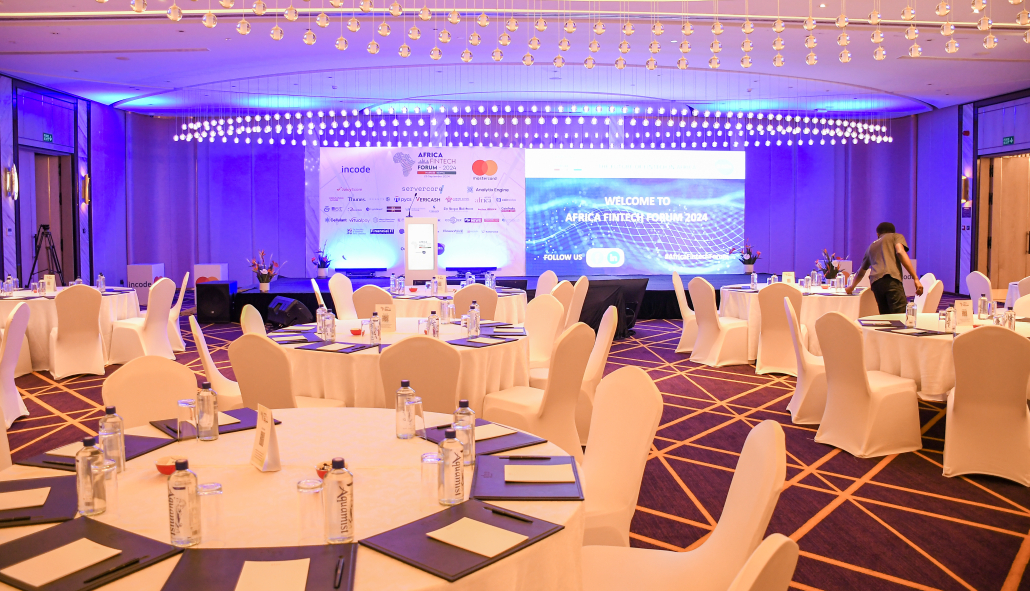
How to Make an Event Budget in Kenya
The venue is often one of the most significant costs in any event. Budgeting for venue costs requires consideration of rental fees, additional charges, and permits.
-
Rental Fees for Conference Halls, Outdoor Spaces, Hotels, etc.: This includes the basic cost for renting the event space based on size, location, and duration. It can vary significantly depending on whether you’re hosting in a convention center, hotel ballroom, or outdoor venue.
-
Security Deposits and Location-Specific Permits: Many venues require a refundable deposit to cover any damages or additional cleaning costs. Additionally, some locations may require special permits, such as for outdoor events or events involving alcohol.
-
Hidden Charges: There are often additional costs that are not included in the initial rental fee. These could include charges for cleaning, parking, overtime usage of the venue, and venue insurance. These hidden charges should always be clearly understood and factored into the budget.
1.2 Audio-Visual Equipment & Technical Services
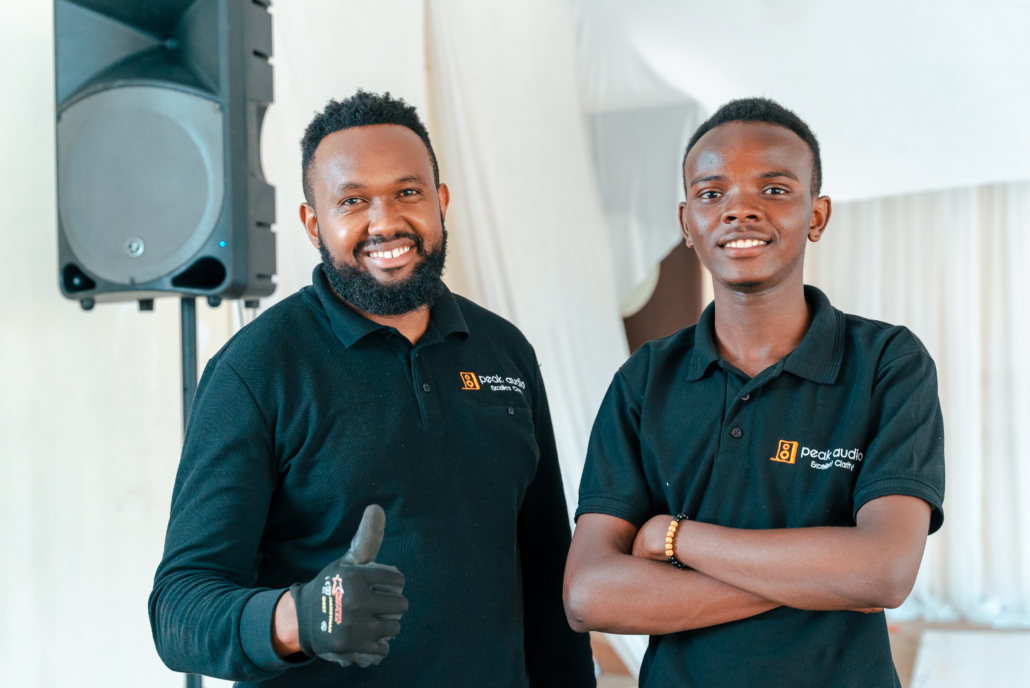
How to Make an Event Budget in Kenya
AV equipment and technical services are essential for modern events. Ensuring high-quality production value requires careful budgeting for the right equipment and personnel.
-
PA Systems, Microphones, Projectors, LED Screens, and Lighting: These items are necessary for both live and virtual events to ensure clear communication, presentations, and visibility. This includes renting or purchasing sound systems, microphones, visual aids (like projectors and LED screens), and lighting systems.
-
Setup, On-Site Support, and Technical Crew Fees: The cost for the setup of AV equipment, as well as hiring on-site technical support, is essential to ensure the event runs smoothly. This often includes the fees for technicians who will manage the AV equipment during the event.
-
Wi-Fi, Live Streaming, and Backup Power Solutions: Wi-Fi services for attendees, live streaming options for virtual participation, and backup power generators in case of power failure should be considered for more tech-heavy events, adding to the overall cost.
1.3 Catering & Hospitality

How to Make an Event Budget in Kenya
Catering and hospitality are vital for creating a positive attendee experience. This includes meals, snacks, beverages, and additional requirements for the comfort of guests.
-
Meals, Snacks, Beverages, and Staff Fees: The cost of food and drink services includes everything from meals and snacks to beverages. The per-person cost will depend on the type of event, whether it’s a sit-down dinner or a casual cocktail hour. Staff fees for waiters, bartenders, and kitchen staff should also be considered.
-
Menu Type (Buffet, Plated, or Cocktail) and Dietary Considerations: The style of food service—buffet, plated meal, or cocktail-style—will influence costs. Dietary needs and preferences, such as vegetarian, gluten-free, or halal options, should also be accounted for.
-
Tent, Chairs, and Table Rentals if Not Provided by Venue: If the venue doesn’t include these, you’ll need to rent additional equipment, such as tents, chairs, tables, and linens. Outdoor events typically require tents for protection from weather.
1.4 Branding & Décor
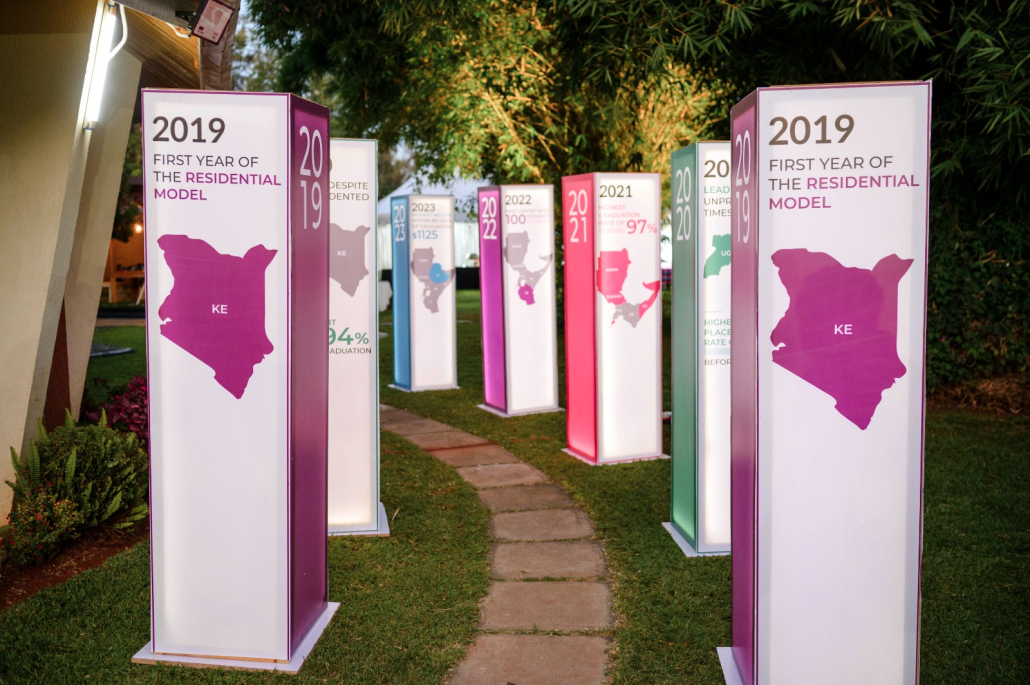
How to Make an Event Budget in Kenya
Event décor and branding help create the desired atmosphere and strengthen the event’s theme. Proper budgeting for these items ensures the event remains cohesive and impactful.
-
Banners, Stage Backdrops, Signage, and Digital Displays: These are essential for branding and creating a welcoming environment. Banners and stage backdrops help communicate the theme, while digital displays can show event schedules or sponsor logos.
-
Floral Arrangements, Lighting Design, and Seating Layout: Floral arrangements and lighting enhance the aesthetic, while seating layouts need to be designed to promote engagement and comfort. The cost of floral design, professional lighting, and creative seating plans should be included.
-
Custom Props and Thematic Elements: For a unique or themed event, custom props and elements like branded giveaways or special decorations may be necessary. These items can help reinforce the event’s branding and leave a lasting impression.
1.5 Entertainment & Speakers

How to Make an Event Budget in Kenya
Hiring quality speakers and entertainment can elevate an event. Budgeting for this category includes fees for talent, travel, and any permits or licensing required.
-
Fees for Keynote Speakers, Emcees, DJs, and Performers: Hiring professionals such as keynote speakers, DJs, or performers adds excitement and value to the event. The cost varies depending on the popularity of the talent and the event’s scale.
-
Travel, Accommodation, and Hospitality for Special Guests: If your speakers or performers are coming from out of town, you’ll need to cover their travel, accommodation, and meals. This should be factored into your budget as well.
-
Licensing or Performance Permits (If Required): Certain entertainment or performances may require permits or licenses (e.g., music licensing for live performances). These fees should be accounted for to avoid any legal issues.
1.6 Marketing & Promotion

How to Make an Event Budget in Kenya
Effective marketing is key to attracting attendees and sponsors to your event. This section of the budget should include all promotional activities, both online and offline.
-
Digital Ads (Facebook, Google, Instagram), Posters, and Flyers: Advertising is critical to ensuring your event reaches the right audience. This includes paid ads on social media, as well as print materials like posters and flyers to promote the event locally or in specific sectors.
-
Event Website, RSVP Systems, and Ticketing Platforms: Creating an event website, setting up RSVP systems, and using online ticketing platforms may be necessary to streamline attendee registration and promote the event.
-
Influencer Marketing or PR Agency Involvement: If you’re seeking wider exposure, you may want to consider influencer marketing or hiring a PR agency to help with promotion. This can be especially useful for larger events or events targeting a specific demographic.
1.7 Staffing & Logistics

How to Make an Event Budget in Kenya
Effective event execution relies heavily on staffing and logistical coordination. These expenses can range from personnel to equipment transport.
-
Ushers, Security, Tech Crew, Registration Staff, and Cleaners: Depending on the event size, you’ll need ushers to guide guests, security personnel to ensure safety, tech crew for AV needs, registration staff for attendee check-in, and cleaning staff for maintaining the venue.
-
Transportation for Materials and Equipment: Consider the cost of transporting any materials or equipment to the event site. This can include shipping costs, truck rentals, and any associated labor costs.
-
Walkie-Talkies, Uniforms, Badges, and ID Tags: Event staff will need walkie-talkies for communication, uniforms for professional appearance, and badges or ID tags for identification purposes. These are often essential for smooth operations during large events.
1.8 Miscellaneous & Contingency Funds

How to Make an Event Budget in Kenya
Unexpected costs can arise in any event. Setting aside a contingency fund is critical to ensure you can manage any unforeseen expenses without disrupting the event.
-
Unexpected Costs, Last-Minute Purchases: These include any unplanned purchases or changes to the event that come up at the last minute, such as emergency AV rentals, additional food, or unanticipated décor items.
-
Event Insurance or Compliance Licenses: Depending on the nature of the event, you may need insurance coverage or special permits, such as liability insurance, event insurance, or compliance with local regulations. These fees should be anticipated in the budget.
-
Recommended Buffer: 10–15% of the Total Budget: It’s always advisable to set aside 10–15% of the total event budget as a contingency fund to cover unforeseen costs that may arise during the planning process or on the event day itself.
An event budget is a comprehensive plan that covers all aspects of the event’s costs. From venue fees to catering, technical support, and entertainment, each element contributes to the overall success of the event. Properly managing each of these elements ensures that you stay within budget while delivering a high-quality experience for all participants. Having a detailed budget also provides a clear financial overview, helping event planners to make informed decisions and avoid unexpected costs.
2. Steps to Create a Practical Event Budget in Kenya
Creating a practical event budget is essential for ensuring that your event runs smoothly, stays within financial limits, and delivers the expected experience. In Kenya, where the cost of services and supplies can vary widely, careful planning is necessary. Here’s a step-by-step approach to building a realistic event budget:
2.1 Define Your Event Objectives and Format
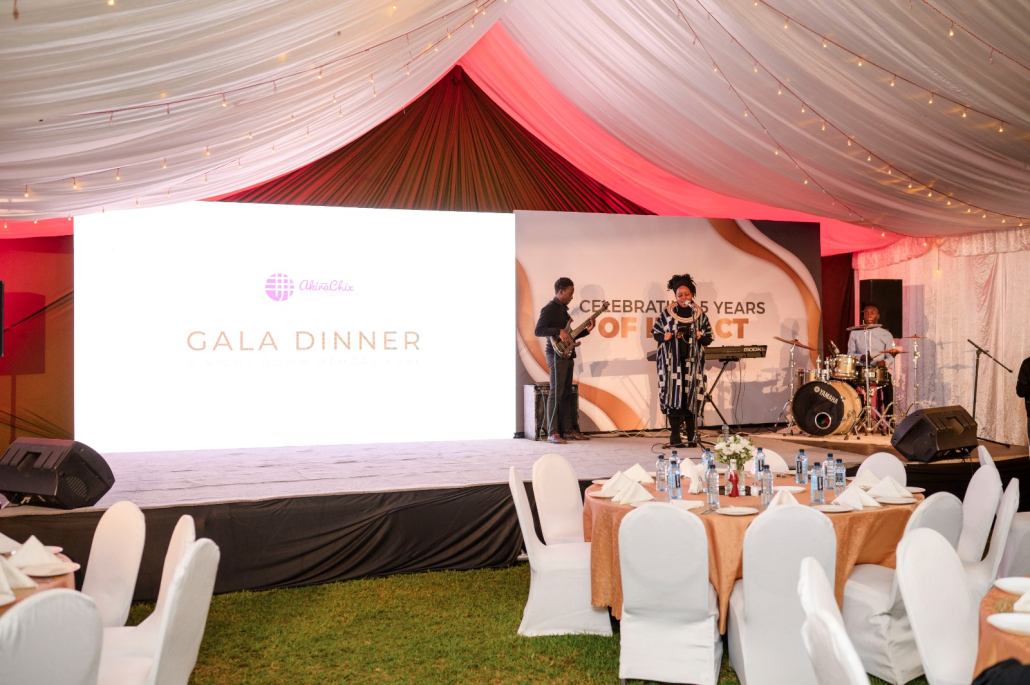
How to Make an Event Budget in Kenya
Understanding the core goals and structure of your event is the first step in creating an accurate budget. Clear objectives guide your budgeting decisions, ensuring funds are allocated where they matter most.
-
Understand the Goal (Conference, Product Launch, Fundraiser, etc.): The type of event you’re hosting significantly influences the budget. For example, a corporate conference may prioritize high-end AV equipment, while a fundraiser might focus more on venue and catering. Clarifying the event’s purpose will help set the tone for budgeting.
-
Audience Size and Expectations Shape the Budget Structure: The size of your audience affects several budget categories, including venue, catering, and staffing needs. Additionally, understanding your audience’s expectations—whether it’s a luxury experience or a more casual gathering—will impact the level of investment in different aspects of the event.
2.2 Break Down All Event Components

How to Make an Event Budget in Kenya
Breaking down the event into its key components helps identify every possible cost involved. This detailed breakdown ensures nothing is overlooked during the budgeting process.
-
List Every Service, Product, or Supplier You’ll Need: From venue hire and catering to audio-visual equipment and entertainment, listing all services and products required will give you a comprehensive view of what you need to budget for. Categorize these elements into major areas like venue, food, technical services, and marketing.
-
Use an Itemized Spreadsheet to Stay Organized: Creating an itemized spreadsheet allows for easy tracking and gives you a clearer overview of all expenses. Include columns for vendor names, quotes, dates of payment, and any notes related to each item. This will keep the planning process transparent and organized.
2.3 Allocate Funds Based on Priorities

How to Make an Event Budget in Kenya
Once you’ve gathered quotes and identified essential services, it’s time to allocate your budget based on the priorities of the event. Certain elements will require more investment, while others can be adjusted.
-
Decide What Areas to Invest In (e.g., AV, Venue, Speakers): Prioritize areas that will have the most impact on your event’s success. For instance, if your event is focused on education or collaboration, you may want to allocate more funds to high-quality audio-visual systems and professional speakers. Conversely, if it’s more of a social gathering, venue and entertainment might be more important.
-
Split Fixed vs. Variable Costs for Accurate Tracking: Divide your budget into fixed and variable costs. Fixed costs (like venue rental) remain constant, while variable costs (like catering) may fluctuate based on the number of attendees. Keeping this distinction clear allows for more accurate financial tracking.
2.4 Track Spending Throughout the Planning Process

How to Make an Event Budget in Kenya
Tracking your spending as you move through the planning phase ensures you stay within budget and prevents surprises at the end. Consistent monitoring is key to keeping finances in check.
-
Use Budgeting Tools or Excel Sheets: Utilizing budgeting tools like Excel or dedicated event planning software can help you track your spending efficiently. These tools allow you to update your budget in real-time, track payments, and adjust estimates as necessary.
-
Keep Receipts, Invoices, and Payment Confirmations: Document all financial transactions with receipts, invoices, and payment confirmations. This not only helps in tracking expenses but also makes accounting and reconciliation easier. Having a clear paper trail ensures that you won’t miss any payments or overspend.
2.5 Adjust and Review the Budget Regularly

How to Make an Event Budget in Kenya
Even with meticulous planning, unexpected changes are inevitable. Regularly reviewing and adjusting the budget allows you to stay on top of changes and make informed decisions.
-
Make Room for Unexpected Changes: Unforeseen costs, such as last-minute venue changes or equipment rentals, may arise during the planning process. Set aside a contingency fund (typically 10-15% of the total budget) to cover these unexpected expenses.
-
Communicate Updates to the Entire Planning Team: Regularly share budget updates with your planning team to ensure everyone is on the same page. This prevents misunderstandings and helps identify potential cost-saving measures early on. Transparency ensures the team remains focused on the financial objectives.
Creating a practical event budget in Kenya involves defining your event’s goals, breaking down components, comparing vendor quotes, prioritizing spending, and tracking progress throughout the planning process. By regularly reviewing the budget and adjusting it as necessary, you can ensure that the event stays within financial limits without compromising quality. Having a detailed and flexible budget gives you a clear pathway to hosting a successful event while managing costs effectively.
3. Tools & Templates for Effective Budgeting
Effective budgeting is crucial for event planning, especially when handling multiple tasks and service providers. In Kenya, where event costs can fluctuate, having the right tools and templates to stay organized and ensure financial control is essential. Here’s a breakdown of some powerful tools and templates you can use to streamline your event budget management.
3.1 Event Budget Spreadsheet Templates
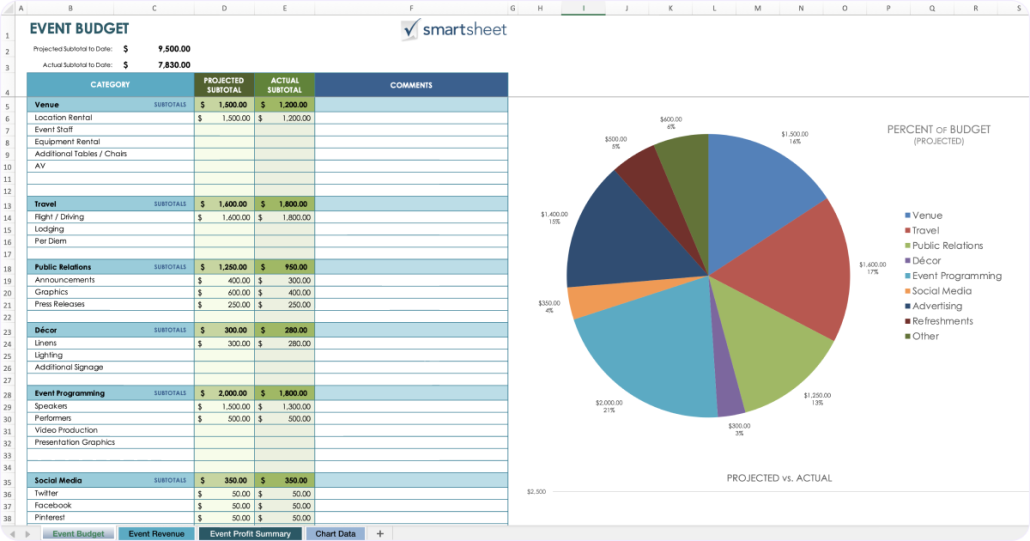
How to Make an Event Budget in Kenya
A well-structured budget template is essential for keeping track of all your event-related costs and ensuring that you don’t miss any expenses. Whether you’re using Excel or Google Sheets, customizable templates provide flexibility and easy tracking.
-
Excel or Google Sheets Templates with Editable Line Items: These spreadsheet templates allow you to input specific details about every budget category, such as venue costs, catering, AV equipment, and more. By editing line items, you can tailor the template to your event’s needs, ensuring you capture all costs—both fixed and variable.
-
Pre-Formatted with Categories & Subcategories: Budgeting templates typically come pre-formatted with different categories (e.g., Venue, AV Equipment, Catering, etc.), helping you organize expenses efficiently. You can add subcategories to capture detailed costs like permits, transportation, or contingency fees.
-
Real-Time Collaboration: Google Sheets allows real-time collaboration, making it ideal for team-based event planning. Multiple stakeholders, such as event coordinators and financial planners, can simultaneously update the budget, ensuring everyone is on the same page.
-
Trackable Spend and Forecasting: Both Excel and Google Sheets offer functionality to track actual spending against your budget and forecast future expenses. You can highlight any potential overspending and adjust in real-time to stay within your financial limits.
3.2 Budgeting Apps for Kenyan Event Planners
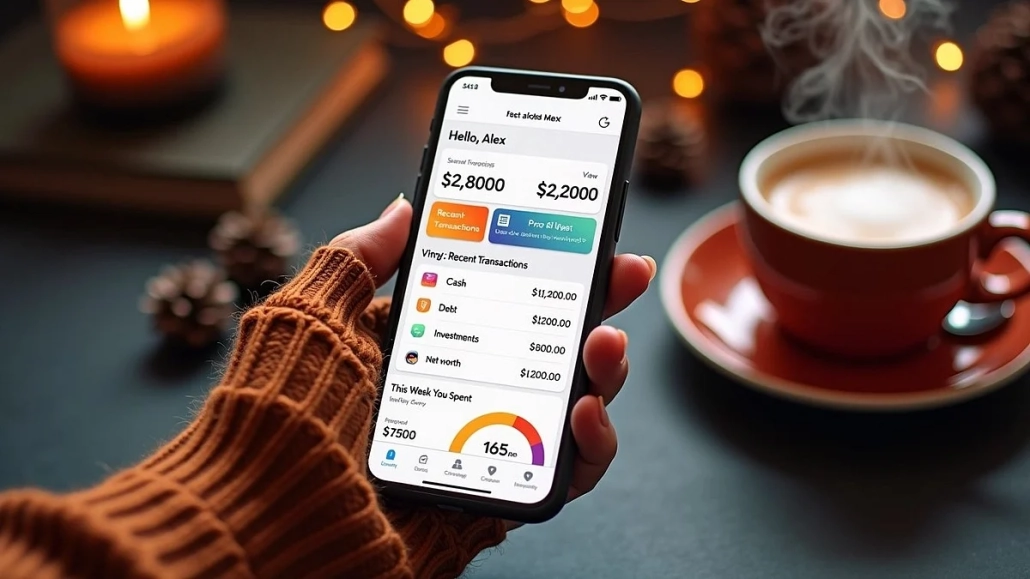
How to Make an Event Budget in Kenya
When planning events in Kenya, using specialized budgeting apps helps event planners stay on top of their finances in a more organized and efficient manner. These apps offer collaborative features, ease of use, and integration with other project management tools.
-
Tools like Trello, Asana, Zoho, or Eventbrite Budgeting: Event planners can use project management tools like Trello or Asana, which provide budgeting features in addition to task and timeline management. These platforms offer customizable boards or tasks where you can track each budget item, allocate funds, and keep track of deadlines.
-
Integrated Budgeting and Planning Features: Apps like Zoho or Eventbrite are designed specifically for event planning, offering integrated budgeting tools where you can monitor expenses, manage vendors, and track payments. These apps also help in forecasting, so you can predict any financial risks ahead of time and plan accordingly.
-
Real-Time Budget Adjustments: Many event planning apps allow for real-time updates and alerts. You can set notifications for overspending or when costs are nearing the limit, helping you make quick adjustments and prevent any budget overruns.
-
Access on Multiple Devices: Most budgeting apps are cloud-based, meaning you can access your budget and make updates from anywhere—be it a desktop or mobile device. This flexibility is especially beneficial for event planners on the go, attending meetings or site visits while keeping tabs on their financial commitments.
3.3 Pro Budget Checklist by Peak Audio

How to Make an Event Budget in Kenya
A professional checklist helps event planners manage the specific financial requirements of an audio-visual and technical setup. Peak Audio offers a downloadable checklist that ensures no aspect of AV budgeting is overlooked, from equipment rental to technical support.
-
Downloadable Checklist for Audio-Visual and Tech Budgeting: This detailed checklist includes line items for every aspect of AV and technical setup, such as microphones, speakers, projectors, LED screens, lighting, and technicians. It also covers additional costs like power backup, Wi-Fi, and live streaming.
-
Comprehensive AV Focus: Since AV services are often a major portion of the event budget, Peak Audio’s checklist focuses on ensuring all AV needs are met. It covers rental costs, installation, operation, and any extra services like remote support or additional equipment, ensuring that the AV budget is accurate and complete.
-
Easy-to-Use Format: The checklist is structured to be easy to follow, allowing planners to quickly check off completed tasks and stay organized throughout the process. It is available for download in PDF or Excel format, offering flexibility in usage.
-
Track Vendor Costs and Deadlines: Along with helping you stay organized, the checklist helps you track the specific costs associated with AV equipment and services, allowing for better negotiation with suppliers and accurate budgeting for future events.
Utilizing the right tools and templates is crucial for effective budgeting in event planning. From customizable spreadsheets and specialized budgeting apps to detailed AV-specific checklists, each tool serves a unique purpose in helping you maintain financial control. By leveraging these resources, event planners in Kenya can ensure that their budgets are accurate, their expenses are tracked efficiently, and their events run smoothly without financial surprises.
4. Common Event Budgeting Mistakes to Avoid

How to Make an Event Budget in Kenya
Event budgeting is a critical part of the planning process. However, many planners make mistakes that can result in unexpected costs, delays, or even event failure. Avoiding these common budgeting mistakes ensures that your event stays within budget and runs smoothly. Here’s a breakdown of the most common event budgeting mistakes to avoid and how to manage them effectively.
4.1 Underestimating Hidden or Add-On Costs
It’s easy to overlook certain costs when preparing an event budget, but these hidden or add-on costs can quickly add up and throw off your financial planning.
-
Overtime Charges: Many venues and service providers charge extra for overtime or extended hours, especially if your event runs later than scheduled. These charges can be substantial, so always inquire about overtime rates upfront and account for possible delays in your budget.
-
Permit Fees: Depending on the location and type of event, you may need permits for things like outdoor setups, liquor licenses, or noise permits. Be sure to inquire about any necessary permits and their associated costs during the planning phase to avoid last-minute surprises.
-
Cleaning Costs: Some venues may charge extra for cleaning, especially if the event is large or the space requires significant clean-up after the event. Confirm whether cleaning fees are included in the venue rental or if they will be charged separately, and allocate funds accordingly.
-
Taxes and Service Charges: Many vendors and venues will add taxes or service charges to the base price of services or rentals. These fees might not be explicitly mentioned in the initial quote, so ensure you ask for the total cost, including all additional charges, and adjust your budget.
4.2 Forgetting to Allocate for Contingencies
Even with the best planning, unexpected events or emergencies can disrupt your event. Allocating a contingency fund in your budget helps you manage any surprises that arise.
-
Emergencies Can Derail an Otherwise Great Plan: Whether it’s a last-minute equipment malfunction, a change in the weather, or a vendor going off-schedule, having a contingency budget helps you handle unforeseen circumstances. Aim for 10-15% of your total budget to be reserved for emergencies or unexpected expenses.
-
Buffer for Vendor Issues: Vendors may not always deliver as expected, and having contingency funds allows you to cover costs for alternate suppliers or solutions. For example, if your AV system fails or a keynote speaker cancels, you’ll be able to handle the extra costs of a replacement.
-
Ensures Financial Flexibility: By accounting for potential issues in advance, you’ll reduce the risk of financial strain and ensure that you can maintain a smooth and well-executed event, even when things don’t go as planned.
4.3 Not Getting Written Contracts from Vendors
Verbal agreements and informal quotes might seem convenient at the time, but they can lead to misunderstandings and financial surprises later on.
-
Avoid Misunderstandings: Always get written contracts from your vendors that clearly outline all agreed-upon terms, including services, pricing, timelines, and deliverables. This prevents any confusion about what is included in the contract and helps clarify each party’s responsibilities.
-
Surprise Expenses: Without a written agreement, vendors may add additional charges for things that were not discussed or agreed upon. These surprise costs can quickly add up and blow your budget. Make sure the contract includes all potential extra costs, such as setup fees, delivery charges, or additional services.
-
Legal Protection: A written contract serves as a legal document, protecting both you and the vendor in case of disputes. If something goes wrong, you’ll have a formal agreement that outlines what was promised, which can be useful for resolving issues quickly.
4.4 Ignoring Post-Event Costs
While it’s important to focus on the costs leading up to and during your event, post-event costs are often forgotten and can catch event planners off guard.
-
Clean-Up: Many event venues charge additional fees for post-event cleaning. This can be particularly important for events that generate a lot of waste or involve large-scale catering. Be sure to clarify with the venue whether clean-up is included in the price or if you need to budget separately for it.
-
Equipment Return and Rentals: If you’ve rented equipment for your event, you’ll need to account for the cost of returning it. Many rental companies charge late fees or additional delivery fees if the equipment is returned late. Be sure to track rental return deadlines and factor in any related costs.
-
Thank-You Notes and Gifts: After the event, sending thank-you notes or gifts to your speakers, sponsors, or key participants is an excellent gesture, but it comes with costs. Allocate a portion of your budget for these post-event tasks to avoid having to scramble to find funds later.
-
Vendor Settlements: Don’t forget to account for any final payments or gratuities to vendors once the event is over. Delaying these payments or forgetting to budget for them can affect your reputation and result in penalties or bad reviews.
Event budgeting requires careful attention to detail, but avoiding these common mistakes will help you stay on track and ensure your event runs without unexpected financial setbacks. Always factor in hidden costs, set aside a contingency fund, get written contracts from vendors, and remember to include post-event expenses in your budget. With proper planning and financial foresight, you can create a smooth and successful event experience without exceeding your budget.
5. Budgeting for AV Equipment with Peak Audio
When it comes to budgeting for AV equipment, one of the most important aspects is ensuring you get high-quality service and products while staying within your financial limits. Peak Audio provides transparent pricing, tailored solutions, and expert advice to help you optimize your AV budget. Here’s how Peak Audio supports event planners in managing AV costs efficiently.
5.1 Transparent Pricing with No Hidden Costs

How to Make an Event Budget in Kenya
One of the most frustrating parts of event planning is dealing with unexpected costs that weren’t initially accounted for in the budget. Peak Audio eliminates this issue by offering clear and transparent pricing.
-
Itemized Quotes: Peak Audio provides detailed, itemized quotes that outline each piece of equipment and service, allowing you to see exactly where your money is going. This transparency helps you avoid surprises and ensures that you can make informed decisions about what to include in your AV setup.
-
Clear Billing: All charges are explained upfront, with no hidden fees or unexpected add-ons. Whether you’re renting AV equipment or hiring technical support, you can be confident that the price you receive is the price you’ll pay. This eliminates the common issue of surprise fees after the event.
-
Pre-Event Budget Clarity: Before committing to any equipment or services, you’ll receive a full breakdown of your expenses, allowing you to adjust your budget or request alternatives if necessary. Peak Audio’s clear pricing helps you stick to your event’s financial goals.
5.2 Custom AV Packages to Fit Your Budget
Every event is unique, and so are its AV requirements. Peak Audio offers customized AV packages designed to suit a wide range of events, whether it’s a small business meeting or a large-scale exhibition.
-
Tailored Solutions for Different Event Sizes: From intimate gatherings to large conferences, Peak Audio can create bespoke AV packages that suit your specific needs. This ensures you only pay for what you need and don’t overspend on unnecessary equipment.
-
Flexible Budget Options: Peak Audio understands that not every event has the same budget. That’s why they provide scalable options that can be adjusted based on your financial constraints, ensuring you can get the best AV solutions without breaking the bank.
-
Comprehensive AV Solutions: Whether you need microphones, speakers, video screens, or lighting, Peak Audio will customize the AV setup for your event to meet both your technical requirements and your budget. They help you choose the essential equipment that delivers the best performance without excess.
5.3 Expert Advice to Maximize Value
Choosing the right AV equipment can be a challenge, especially with so many options available. Peak Audio offers expert advice to help you make the best decisions, ensuring you get the most value for your money.
-
Personalized Consultation: Peak Audio’s experienced professionals will guide you through the process of selecting the AV equipment that best suits your event. They take into account the size of your venue, the type of event, and your specific technical requirements to recommend the most cost-effective solutions.
-
Optimizing Equipment Use: Instead of upselling unnecessary services or equipment, Peak Audio focuses on what’s essential for your event. Their goal is to maximize the value of each piece of equipment, ensuring you don’t pay for extra features that won’t be used.
-
Informed Decision-Making: With Peak Audio’s advice, you can make informed decisions that align with your event goals and budget. This ensures that you get the most out of your AV setup, enhancing the overall experience without overspending.
5.4 Bundled Packages for AV, Lighting, and Streaming
Bundling services is an excellent way to save money while ensuring your event gets comprehensive AV support. Peak Audio offers bundled packages that combine AV equipment, lighting, and streaming services.
-
Cost Savings with Bundles: By choosing bundled packages, you can save money compared to booking each service separately. Peak Audio offers package deals that include everything from microphones and speakers to video walls, lighting, and streaming services. This makes it easier to manage your event’s AV budget.
-
Comprehensive Service Offering: Bundled packages include all necessary technical services, reducing the need to coordinate with multiple vendors. This streamlines the planning process and ensures that all components of your event are synchronized.
-
Flexible Bundle Options: Peak Audio offers customizable bundles that allow you to pick and choose the services you need. This flexibility ensures that you can stay within budget while still getting high-quality AV equipment and support.
When planning an event, managing the AV budget efficiently is crucial to ensuring a successful and cost-effective event. With Peak Audio, you get transparent pricing, custom AV packages, expert advice, and bundled services that provide both value and flexibility. Their personalized approach to AV solutions helps you stay within budget while ensuring top-notch technical support and equipment. By working with Peak Audio, you can focus on your event’s success without worrying about unexpected costs or technical challenges.
6. Sample Budget for a Business Event in Kenya
The sample budgets below provide a detailed cost breakdown for mid-sized corporate conferences with 100, 200, and 500 guests. The categories include venue costs, AV equipment, catering, branding, entertainment, staff, and miscellaneous costs.
6.1 Small-Size Corporate Conference – 100 Guests
| Category | Item | Estimated Cost (KES) |
|---|---|---|
| Venue Costs | Venue Rental (Conference Hall, Outdoor, etc.) | 100,000 – 150,000 |
| Security Deposits & Permits | 20,000 – 30,000 | |
| Additional Venue Charges (cleaning, overtime) | 10,000 – 20,000 | |
| Audio-Visual Equipment & Technical Services | PA System & Microphones | 30,000 – 50,000 |
| Projectors & LED Screens | 50,000 – 70,000 | |
| Technical Support Staff | 15,000 – 20,000 | |
| Live Streaming & Wi-Fi | 25,000 – 40,000 | |
| Catering & Hospitality | Meals (buffet, snacks, drinks) | 30,000 – 50,000 |
| Coffee Breaks & Refreshments | 10,000 – 15,000 | |
| Staff Costs (service staff) | 10,000 – 15,000 | |
| Branding & Décor | Event Branding (Banners, Backdrops) | 20,000 – 40,000 |
| Décor (Floral Arrangements, Lighting) | 15,000 – 25,000 | |
| Thematic Props | 10,000 – 20,000 | |
| Entertainment & Speakers | Keynote Speaker Fees | 50,000 – 80,000 |
| MC or Host Fees | 20,000 – 30,000 | |
| Travel & Accommodation for Guests | 10,000 – 20,000 | |
| Staffing & Logistics | Event Staff (ushers, registration, tech crew) | 20,000 – 30,000 |
| Transportation for Equipment | 10,000 – 15,000 | |
| Walkie-Talkies, Uniforms, Badges | 5,000 – 10,000 | |
| Miscellaneous & Contingency | Unexpected Costs (last-minute purchases) | 10,000 – 15,000 |
| Buffer (10% of total budget) | 20,000 – 30,000 | |
| Total Estimated Budget | 450,000 – 650,000 |
6.2 Mid-Size Corporate Conference – 200 Guests
| Category | Item | Estimated Cost (KES) |
|---|---|---|
| Venue Costs | Venue Rental (Conference Hall, Outdoor, etc.) | 200,000 – 300,000 |
| Security Deposits & Permits | 30,000 – 50,000 | |
| Additional Venue Charges (cleaning, overtime) | 15,000 – 30,000 | |
| Audio-Visual Equipment & Technical Services | PA System & Microphones | 60,000 – 90,000 |
| Projectors, LED Screens, and Video Walls | 100,000 – 150,000 | |
| Technical Support Staff | 30,000 – 40,000 | |
| Live Streaming & Wi-Fi | 40,000 – 60,000 | |
| Catering & Hospitality | Meals (buffet-style, lunch, snacks) | 60,000 – 100,000 |
| Coffee Breaks & Refreshments | 20,000 – 30,000 | |
| Staff Costs (service staff) | 20,000 – 30,000 | |
| Branding & Décor | Event Branding (Banners, Backdrops) | 30,000 – 50,000 |
| Décor (Floral Arrangements, Lighting) | 30,000 – 50,000 | |
| Entertainment & Speakers | Keynote Speaker Fees | 80,000 – 120,000 |
| MC or Host Fees | 30,000 – 40,000 | |
| Travel & Accommodation for Guests | 20,000 – 30,000 | |
| Staffing & Logistics | Event Staff (ushers, registration, tech crew) | 30,000 – 50,000 |
| Transportation for Equipment | 20,000 – 30,000 | |
| Walkie-Talkies, Uniforms, Badges | 10,000 – 15,000 | |
| Miscellaneous & Contingency | Unexpected Costs (last-minute purchases) | 20,000 – 30,000 |
| Buffer (10% of total budget) | 30,000 – 50,000 | |
| Total Estimated Budget | 700,000 – 1,100,000 |
6.3 Large-Size Corporate Conference – 500 Guests
| Category | Item | Estimated Cost (KES) |
|---|---|---|
| Venue Costs | Venue Rental (Large Conference Hall, Outdoor) | 300,000 – 500,000 |
| Security Deposits & Permits | 50,000 – 70,000 | |
| Additional Venue Charges (cleaning, overtime) | 30,000 – 50,000 | |
| Audio-Visual Equipment & Technical Services | PA System & Microphones | 100,000 – 150,000 |
| Projectors, LED Walls, Video Walls | 150,000 – 250,000 | |
| Technical Support Staff | 50,000 – 80,000 | |
| Live Streaming & Wi-Fi | 60,000 – 90,000 | |
| Catering & Hospitality | Meals (buffet, snacks, and beverages) | 100,000 – 150,000 |
| Coffee Breaks & Refreshments | 40,000 – 60,000 | |
| Staff Costs (service staff) | 30,000 – 50,000 | |
| Branding & Décor | Event Branding (Banners, Backdrops) | 50,000 – 70,000 |
| Décor (Floral Arrangements, Lighting) | 50,000 – 80,000 | |
| Entertainment & Speakers | Keynote Speaker Fees | 120,000 – 200,000 |
| MC or Host Fees | 40,000 – 60,000 | |
| Travel & Accommodation for Guests | 30,000 – 50,000 | |
| Staffing & Logistics | Event Staff (ushers, registration, tech crew) | 50,000 – 70,000 |
| Transportation for Equipment | 30,000 – 50,000 | |
| Walkie-Talkies, Uniforms, Badges | 15,000 – 25,000 | |
| Miscellaneous & Contingency | Unexpected Costs (last-minute purchases) | 30,000 – 50,000 |
| Buffer (10% of total budget) | 50,000 – 70,000 | |
| Total Estimated Budget | 1,200,000 – 1,800,000 |
These sample budgets provide a comprehensive guide to planning a mid-sized corporate conference in Kenya. The cost estimates for different conference sizes (100, 200, and 500 guests) give you an understanding of where to allocate funds, from venue and AV equipment to catering, staff, and contingency costs. By clearly outlining the costs in categories, you can ensure your event stays within budget while meeting all technical and logistical requirements.
7. Frequently Asked Questions (FAQs)

How to Make an Event Budget in Kenya
Here are detailed answers to some of the most common questions about budgeting for events, specifically related to audio-visual services and how Peak Audio can assist you.
7.1 How much should I budget for AV services in Kenya?
The budget for AV services in Kenya can vary depending on the scale and complexity of the event. Several factors come into play, including the size of the venue, the number of attendees, and the type of AV equipment needed.
-
Small Events: For smaller events like workshops or meetings with up to 50 attendees, you might budget between KES 50,000 and KES 150,000. This typically covers basic AV equipment like microphones, projectors, and screens.
-
Medium to Large Events: For conferences, corporate events, or expos with up to 200 attendees, the budget might range from KES 150,000 to KES 500,000. This includes more advanced setups such as LED screens, sound systems, and lighting.
-
Major Events: Large-scale events with hundreds of attendees (e.g., conferences or product launches) can require a budget of KES 500,000 to KES 1 million or more. These events often require comprehensive AV setups including multiple screens, cameras for live streaming, and high-quality sound systems.
Peak Audio can provide a detailed, tailored quote based on your specific requirements, helping you stay within your budget without compromising on quality.
7.2 What’s the ideal contingency percentage for an event?
A contingency fund is essential for covering unexpected expenses during event planning. The ideal contingency percentage typically ranges from 10% to 15% of your total budget. This buffer accounts for last-minute changes, additional services, or unforeseen challenges that may arise.
For example:
-
If your total budget for the event is KES 500,000, setting aside KES 50,000 to KES 75,000 for contingencies ensures you’re prepared for any surprise costs, such as extra rentals, transportation costs, or additional technical support.
Peak Audio recommends incorporating a contingency fund in your AV budget to ensure any last-minute needs can be addressed without exceeding your planned expenses.
7.3 Can I still have a great event on a small budget?
Yes, you can absolutely have a successful and memorable event on a small budget. The key is to prioritize your event’s needs and focus on the essentials.
-
Smart AV Solutions: With Peak Audio, you can select cost-effective AV packages that fit your event’s specific needs without overspending. They offer scalable solutions that provide the necessary AV equipment for a small event while maintaining high-quality standards.
-
Leverage Technology: Consider using smaller, multi-functional equipment. For instance, an all-in-one AV system with built-in microphones, speakers, and cameras may be sufficient for smaller gatherings.
-
Simplify the Setup: For small events, fewer screens, basic lighting, and a simpler sound system can still create a great experience for your guests.
Peak Audio’s experts can help you choose the right equipment that maximizes your event’s potential, even on a tight budget.
7.4 How can I estimate costs if it’s my first time planning?
Estimating costs for your first event can feel overwhelming, but there are several steps you can follow to ensure you stay on track:
-
List All Key Components: Start by listing out all the elements of your event—venue, AV equipment, catering, entertainment, and any other services you’ll need. Break down each section into categories and research pricing for each item.
-
Get Quotes: Reach out to vendors for quotations. This includes Peak Audio for AV services, as they can provide a detailed quote based on your requirements.
-
Use Budgeting Tools: Utilize budgeting tools like Excel spreadsheets, Google Sheets, or event planning software to track expenses and allocate funds for each component.
-
Consult with Professionals: Don’t hesitate to consult event planning professionals, including AV experts from Peak Audio, who can offer valuable advice on what you need and provide cost estimates for the AV services you require.
Peak Audio’s team can help guide you through the planning process, ensuring that your AV budget is well-organized and aligned with your event goals.
7.5 Does Peak Audio help with overall event budgeting or just AV?
Peak Audio specializes in providing expert audio-visual services, but they can certainly assist with budgeting for AV components within your overall event budget.
-
AV Focused Budgeting: Peak Audio helps you break down the costs associated with AV equipment, including rental, installation, setup, and support. They will provide you with an itemized quote and help you understand the costs involved.
-
Collaborative Support for Event Planning: While Peak Audio primarily focuses on AV, their experts can offer insights into how AV expenses fit into the larger event budget. They can help you make decisions on what AV equipment is essential based on your event’s objectives and the space you’re working with.
-
Customized AV Packages: Peak Audio can tailor a package that fits within your broader event budget, helping you balance AV costs with other event expenses like catering, entertainment, and venue rental.
If you need assistance with the overall event budget, Peak Audio can recommend trusted partners for other services and guide you in aligning all your event costs to ensure a cohesive financial plan.
7.6 How far in advance should I book AV equipment for my event?
Booking AV equipment as early as possible is essential, especially for larger events or during peak seasons. Ideally, you should book at least 3-6 weeks in advance, but for major events or conferences, consider booking 6 months ahead.
-
Availability: The sooner you book, the more likely you are to secure the equipment and support you need. Peak Audio often experiences high demand during certain months, and booking in advance ensures that they can provide the necessary equipment.
-
Setup and Testing: Booking early gives you ample time for testing and ensuring everything works seamlessly ahead of the event. This is especially important for technical equipment like projectors, microphones, and video conferencing setups.
-
Discounts and Early Bird Deals: Sometimes, booking early can help you take advantage of discounts or special offers. Peak Audio may also provide better pricing for early bookings, so it’s always worth securing your AV services as soon as possible.
7.7 What are the benefits of hiring a professional AV company like Peak Audio?
Hiring a professional AV company like Peak Audio offers several advantages:
-
Expertise: Peak Audio has extensive experience in designing and setting up AV systems for all types of events, ensuring everything runs smoothly.
-
High-Quality Equipment: They provide top-notch, well-maintained AV equipment that guarantees superior sound, visual, and streaming experiences.
-
On-Site Support: Peak Audio offers on-site technical support, ensuring any issues that arise during the event can be quickly resolved, minimizing disruptions.
-
End-to-End Services: From consultation to installation, setup, and live event support, Peak Audio offers comprehensive services, taking the stress out of AV planning.
7.8 Can Peak Audio provide live streaming for my event?
Yes, Peak Audio can provide high-quality live streaming services for your event. Here’s how their professional live streaming services benefit you:
-
Comprehensive Streaming Solutions: Peak Audio streams your event on various platforms (Zoom, YouTube Live, Facebook Live, etc.), ensuring global accessibility for your audience.
-
Top-Quality Equipment: They use high-definition cameras, professional audio systems, and optimized lighting to guarantee crystal-clear visuals and sound.
-
Seamless Multi-Camera Coverage: For larger events, Peak Audio provides multi-camera setups and live-switching technology to capture all key moments, enhancing the viewer’s experience.
-
Engagement Features: Viewers can participate through live chats, Q&A sessions, and social media integration, fostering interaction and engagement.
-
Technical Support: Their team ensures everything runs smoothly with dedicated on-site and remote support, so you don’t have to worry about technical issues.
-
Recording and On-Demand Viewing: Peak Audio records your event for future use, offering on-demand access to content, ideal for attendees who couldn’t join live.
By partnering with Peak Audio for live streaming, you ensure a professional, smooth, and engaging experience for both your in-person and remote attendees.
Master Your Event Budget with Confidence
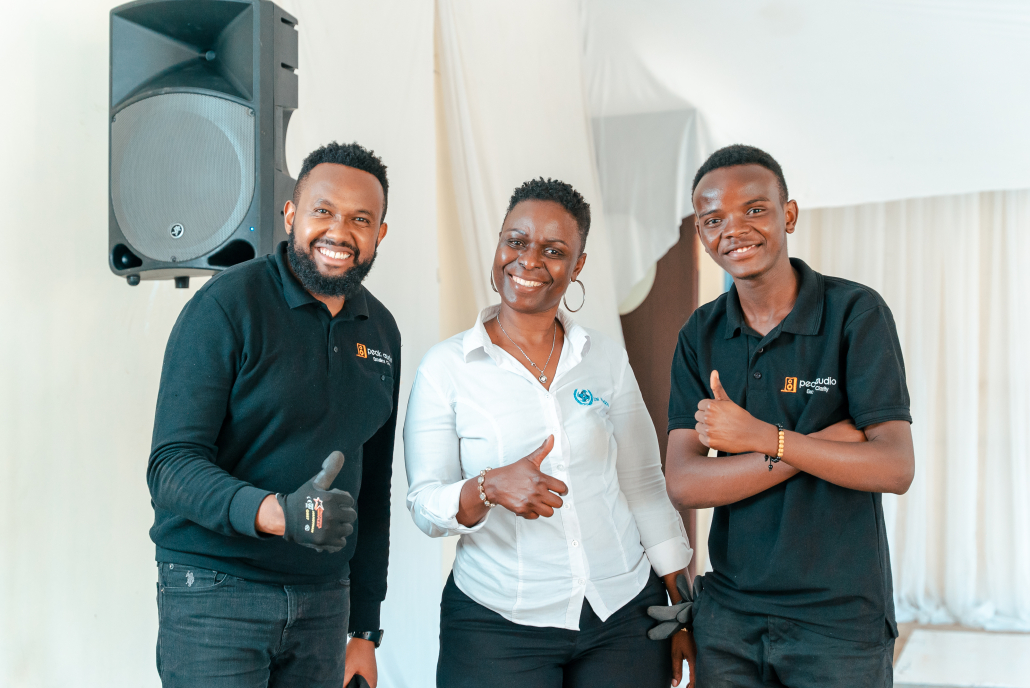
How to Make an Event Budget in Kenya
Peak Audio provides expert advice and budget-friendly AV solutions to help you elevate your event experience. Whether you’re hosting a small corporate meeting or a large conference, their professional AV services and tailored packages ensure top-quality results while staying within your budget.
Partnering with Peak Audio means peace of mind, knowing that your AV needs are in good hands. Reach out today for a personalized quote or budgeting consultation to make your event unforgettable. Visit Peak Audio to get started!